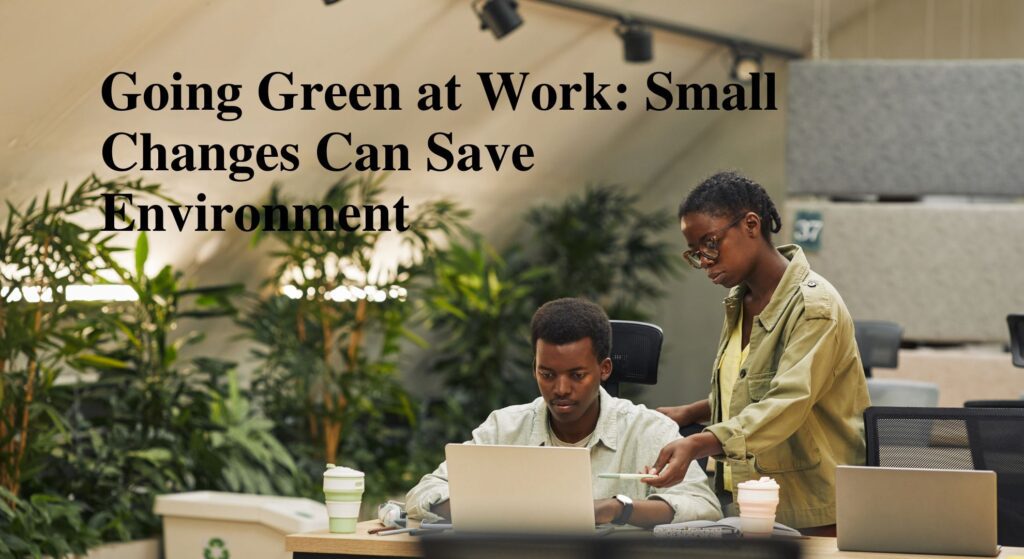
Introduction
In an era where climate change and global warming are becoming increasingly pressing concerns, it is crucial for individuals and organizations to adopt sustainable practices. The workplace, being a significant part of our daily lives, holds immense potential for making a positive impact on the environment. By implementing small but meaningful changes, businesses can contribute to building a green eco-system and promote sustainability. This blog post will explore the importance of going green at work and highlight the small changes that can make a big difference.
Understanding Climate Change and Global Warming
Before delving into the ways to go green at work, it’s essential to grasp the concept of climate change and global warming. Climate change refers to long-term shifts in weather patterns, resulting from increased greenhouse gas emissions and human activities. Global warming, on the other hand, is the rise in the Earth’s average temperature, primarily caused by the release of carbon dioxide and other greenhouse gases into the atmosphere.
The Role of Businesses in Sustainability
Businesses have a vital role to play in addressing climate change and promoting sustainability. By adopting green practices, organizations can reduce their carbon footprint, conserve resources, and contribute to a healthier planet. Going green at work not only benefits the environment but also enhances a company’s reputation, attracts eco-conscious customers, and improves employee morale.
Creating a Green Eco-System at Work
1. Energy Conservation
One of the most effective ways to go green at work is by conserving energy. Simple measures such as switching off lights, using energy-efficient bulbs, and turning off electronic devices when not in use can significantly reduce electricity consumption by choosing Renewable Energy. Employers can also consider investing in renewable energy sources like solar panels to power their offices. Below are the few tips to save more energy at work place.
- Use the day life for office hours instead of using Bulbs
- Use Energy -Efficient Bulbs or LED Bulbs to save more energy
- Use Renewable Energy at office if possible
2. Waste Management
Implementing an efficient waste management system is crucial for any environmentally conscious workplace. Encourage employees to recycle paper, plastic, glass, and metal waste by providing clearly labeled recycling bins. Furthermore, minimize paper usage by promoting digital communication, utilizing cloud storage for document sharing, and printing only when necessary. Adopting a composting program for food waste can also contribute to a greener eco-system.
- Reuse the plastic bottle for various use at work place such as planters etc.
- Use the bottle as container
- Reuse and Recycle the products at office also at home.
3. Sustainable Transportation
Encourage employees to choose greener commuting options. Provide incentives for carpooling, cycling, or using public transportation. Setting up a secure bicycle parking area and installing electric vehicle charging stations can further promote sustainable transportation choices. Organizations can also explore remote work options to reduce commuting altogether.
- Use public transportation to daily travel such as Bus, Metro, Auto rickshaw Etc.
- Use Bi-Cycle and We can use public or personal E-bikes
4. Water Conservation
Conserving water is another essential aspect of going green at work. Encourage employees to use water responsibly, fixing leaky faucets, and installing low-flow faucets and toilets. Promote awareness about water conservation through educational campaigns and posters.
- Reuse the water to plant the water
- Use minimal water for cleaning
- Use the dripping system to water the plant in the office
5. Green Procurement
Making sustainable choices in procurement can have a significant impact on the environment. When sourcing office supplies, opt for products that are made from recycled materials and are recyclable themselves. Choose suppliers that prioritize sustainability and have transparent eco-friendly practices. Additionally, consider using environmentally friendly cleaning products to minimize chemical pollutants in the workplace.
6. Promote Remote Work
The COVID-19 pandemic has shown us the viability and benefits of remote work. Encouraging employees to work remotely, even partially, can result in reduced energy consumption, lower carbon emissions from commuting, and decreased office space requirements. Remote work not only contributes to a greener eco-system but also improves work-life balance and employee satisfaction.
- Remote work help to reduce water wastage at office
- It reduces the electricity consumption at office
- Remote work also help to reduce the air pollution due to less use of transportation
7. Educate and Engage Employees
Creating a culture of sustainability requires the active participation of employees. Conduct regular training sessions and workshops to educate employees about the importance of going green and provide practical tips for incorporating sustainable practices into their daily routines. Encourage feedback and suggestions from employees to foster a sense of ownership and engagement in sustainability initiatives.
- Educate and spread awareness about environmental issues
- Conduct training and seminars to encourage zero wastage and recycle the products
- Help employees to live sustainable life by motivating them
Conclusion
In conclusion, going green at work is not just an option but a responsibility that businesses must embrace to combat climate change, global warming, and promote a sustainable future. By implementing small changes, such as conserving energy, managing waste effectively, promoting sustainable transportation, and engaging employees, organizations can make a significant difference in building a greener eco-system.
It is through collective efforts, both big and small, that we can safeguard our planet for future generations while reaping the benefits of enhanced reputation, increased employee morale, and improved business outcomes. Let us strive to make our workplaces a driving force for positive change and sustainability.